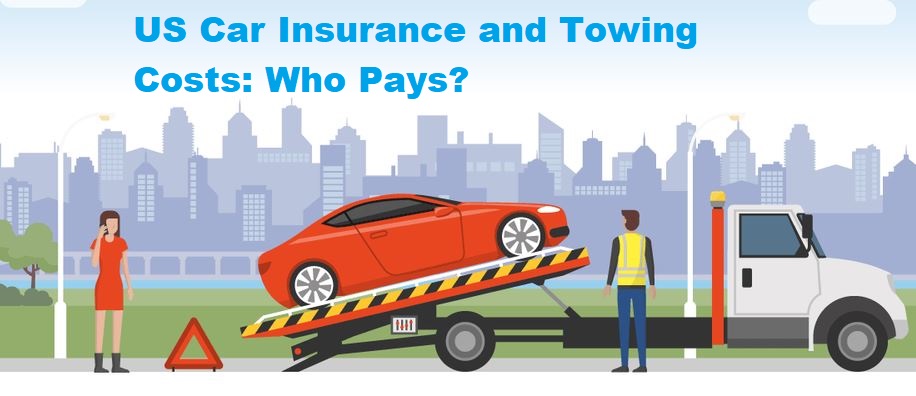Whether or not your car insurance will foot the bill for towing and storing your vehicle post-damage hinges on various factors: the specifics of the incident, liability, and the type of coverage you selected beforehand.
Towing and storing your vehicle after an accident can rack up hefty expenses. However, your auto insurance might come to the rescue.

Whether these costs are covered depends on the accident’s circumstances and who’s deemed responsible. Here’s a breakdown of how insurance for towing and storage can come into play.
How Does Towing and Storage Coverage Work?
In the aftermath of a car-damaging incident, your insurance might foot the bill for towing and storage fees, albeit under varying categories contingent upon your specific car insurance coverage. Towing expenses could fall under:
Here’s how different types of car insurance coverage can handle towing expenses:
- Roadside assistance coverage: This type of coverage offers a range of roadside aids, including towing, jump-starting a dead battery, or refueling a car that’s run out of gas.
- Comprehensive coverage: If your vehicle sustains damage from incidents like hitting a deer and you have comprehensive coverage, towing expenses are typically covered.
- Collision coverage: Towing costs may be covered for accidents included in your collision coverage.
- Liability coverage: If someone else is at fault and their liability coverage should pay for your tow bill if your vehicle is severely damaged, this would be processed as part of your claim through their insurance.
Certain insurers might stipulate that you need to carry comprehensive or collision coverage for your vehicle before you’re eligible to include towing coverage.
Moreover, towing might only be covered as a reimbursable expense. Essentially, this entails footing the bill upfront for towing following an accident, with your insurance reimbursing you afterward. There could be restrictions on the coverage amount, sometimes even as low as $50.
Storage fees for a vehicle post-accident might be covered within a repair claim, up to the disclosed limit. Any charges surpassing this limit could fall on the vehicle owner.
Usually, storage fees accrue on a daily basis. It’s crucial to minimize the duration your vehicle spends in storage to mitigate fees whenever possible. Your insurer may not reimburse you for additional lot fees.
In cases where you’re hit by an uninsured motorist and lack uninsured/underinsured motorist coverage, you could be accountable for these fees. Maintaining adequate coverage on your own vehicle can ensure towing and storage expenses are covered when necessary.
Do I Need to Pay Extra for Roadside Assistance?
There are instances beyond accidents where you might require towing services for your car. If you experience a breakdown, flat tire, or any other car-related issue, a segment of your auto insurance could cater to towing your vehicle to a repair facility.
Often, towing falls under the umbrella of roadside assistance coverage within your auto policy. This coverage might be part of your standard auto policy or available as an optional add-on for an additional fee.
Roadside assistance extends beyond towing, offering services like refueling and jump-starting your battery, making it an appealing addition for many drivers.
Moreover, it’s typically a budget-friendly option, costing between $5 and $15 per month.
What Towing and Storage Fees Am I Responsible For?
While you may have insurance coverage for towing and storage, it often comes with limitations. There are certain fees for which you should be ready to cover out of your own pocket. These may include:
- Towing exceeding mileage or cost limits
- Storage fees surpassing time limits
- Fees linked to an at-fault accident
- Any expenses from an accident where you lack coverage, including towing, as with a liability-only policy.
It’s wise to acquaint yourself with towing and storage expenses in case you find yourself responsible for a portion of them in the future.
According to J.D. Power, the national average cost for a tow trip is $109. Rates typically range between $2.50 and $7 per mile. Several factors can influence these costs, including:
- Time of day
- Weekdays vs. weekends
- Holidays
- Surrounding terrain, such as beach driving
- Vehicle type
Storage fees at tow yards or body shops can often accumulate larger bills compared to towing expenses, and you may not have explicit coverage for them. On average, vehicles are stored for about five to six days following an accident.
These fees are typically charged on a daily basis and can add up significantly, reaching up to $450 within just a few days.
Find Towing and Storage Coverage for Less
When an accident occurs, your insurance policy may offer coverage for certain towing and storage expenses. It’s essential to review your policy to understand what is included.
If you’re considering upgrading to a better auto insurance plan, perhaps one with more comprehensive towing and storage coverage, Experian’s auto insurance comparison tool can be a valuable resource.
By utilizing the comparison tool, you can receive car insurance quotes from over 40 leading providers within minutes.
The coverage comparison ensures a straightforward apples-to-apples comparison with your current policy, making it simple to identify potential savings.